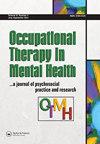被诊断为精神和/或物质使用障碍的个人的睡眠习惯和常规
IF 0.9
Q4 REHABILITATION
引用次数: 2
摘要
摘要本研究旨在探讨个体(N = 52)患有精神和/或物质使用障碍的患者到社区健康中心就诊。结果指标包括匹兹堡睡眠质量指数(PSQI),这是一项研究人员开发的调查,旨在分析习惯和日常生活及其对睡眠的影响,以及半结构化访谈。结果显示,根据PSQI,78.6%的参与者睡眠不佳。睡眠的促进者包括关灯、听音乐和洗澡/淋浴,而障碍包括小睡、吸烟和打电话。这些发现可以指导睡眠准备和参与的评估和干预。本文章由计算机程序翻译,如有差异,请以英文原文为准。
Sleep Habits and Routines of Individuals Diagnosed with Mental and/or Substance-Use Disorders
Abstract The purpose of this study was to explore sleep habits and routines in individuals (N = 52) with mental and/or substance-use disorders attending community wellness centers. Outcome measures included Pittsburgh Sleep Quality Index (PSQI), a researcher developed survey to analyze habits and routines and its effect on sleep, and semi-structured interviews. Results showed 78.6% of participants had poor sleep as per PSQI. Facilitators of sleep included turning off lights, listening to music, and taking a bath/shower, while barriers included taking a nap, smoking, and using the phone. The findings can guide assessment and intervention for sleep preparation and participation.
求助全文
通过发布文献求助,成功后即可免费获取论文全文。
去求助
来源期刊

Occupational Therapy in Mental Health
REHABILITATION-
CiteScore
1.20
自引率
14.30%
发文量
32
期刊介绍:
An essential journal for all OTs in mental health fields, Occupational Therapy in Mental Health provides professionals with a forum in which to discuss today"s challenges-identifying the philosophical and conceptual foundations of the practice; sharing innovative evaluation and treatment techniques; learning about and assimilating new methodologies developing in related professions; and communicating information about new practice settings and special problem areas particular to psychiatric occupational therapy.
 求助内容:
求助内容: 应助结果提醒方式:
应助结果提醒方式:


